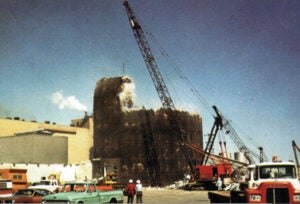Federal Energy Regulatory Commission (FERC) hearings on issues related to natural gas and its use for electric power generation continue this month. The next hearing is set for May 16, two days after Commissioner Philip D. Moeller addresses the natural gas/electric power generation nexus in keynote remarks delivered to the 15th annual ELECTRIC POWER Conference in Chicago. POWER is a media affiliate of the conference.
Moeller and fellow Commissioner Cheryl A. LeFleur pushed last year for FERC to open a docket, No. AD12-12-000, to consider coordination of issues between the natural gas and electric power industries. In testimony to the House Energy and Commerce subcommittee on Energy and Power in March, Moeller said, “the challenges we face with gas and electric coordination is a good problem to deal with as it’s partially the result of abundant domestic gas resources.”
He cautioned, however, that the challenges are “serious, very real, and somewhat urgent,” especially in New England and the Midwest. “Indeed, some in the industry believe nothing short of a major blackout will provide sufficient motivation to the various stakeholders to solve the problems facing us.”
Pipeline companies told a FERC conference last summer that their systems in the Northeast are consistently running near design capacities. The lack of available capacity may limit regional pipeline flexibility and result in flow restrictions and balance requirements. Gas and electric industry participants told FERC that relatively little gas-fired generation in New England is backed by primary firm pipeline transportation contracts. Instead, participants said that generators typically rely on released secondary firm or, to a lesser extent, interruptible transportation pipeline capacity.
An official with the Midwest Independent System Operator (MISO) told FERC that it expects around 30,000 MW of coal-fired generation to be retired or taken offline for retrofits to meet emission standards between 2012 and 2015. This likely will result in a greater reliance on gas-fired generators, raising concerns at MISO about the availability of coal units during winter months when natural gas demand is highest.
In his March testimony, Moeller cited five trends as largely responsible for the growing use of natural gas for power generation. First, it is easier to site and build generating plants that burn natural gas. Second, even though grid expansion can be more efficient and less expensive than building new generating plants, it is increasingly difficult to construct electric transmission lines. Third, baseload generation—and natural gas–fired capacity in particular—is needed to firm growing amounts of intermittent renewable generation resources. Fourth, regulations imposed by the Environmental Protection Agency will result in what Moeller called a “significant amount” of coal generation to be retired or retrofitted. Fifth, lower natural gas prices are the result of new supplies being extracted using technological advances in horizontal drilling and hydraulic fracturing.
Moeller said he worries that warmer weather in 2011 and 2012 may have masked system vulnerabilities that will be exposed when more normal, colder weather patterns occur. “My goal heading into next winter is to have additional confidence that natural gas and electric system operators in each region have widely disseminated and understood communication protocols in the event of extreme weather that results in greater system demands,” he said. Moeller said it’s not yet clear if formal FERC action will be needed to assist those communications channels.
A second issue is whether or not FERC must address differences in gas and electric scheduling and trading days, and whether such changes would foster greater efficiency and increased reliability. Until now, the gas and electric power industries largely operated independently of each other, and if problems arose, sufficient pipeline capacity typically was available. Moeller said that such flexibility is less common as power generators rely more on natural gas–fired generation and non-firm pipeline transportation contracts.
Moeller said FERC also will need to consider whether the correct market rules, investment signals, and environmental policies are in place to ensure that adequate natural gas infrastructure exists to meet growing demand.
Commissioner Moeller’s address at ELECTRIC POWER 2013 is part of a morning Keynote Session and Executive Roundtable that begins at 8:30 a.m. at the Donald E. Stephens Convention Center in Rosemont, Ill., adjacent to O’Hare International Airport. Registration details can be found here.
Source: POWER
—David Wagman, Executive Editor
Note: This story was originally published on May 1









